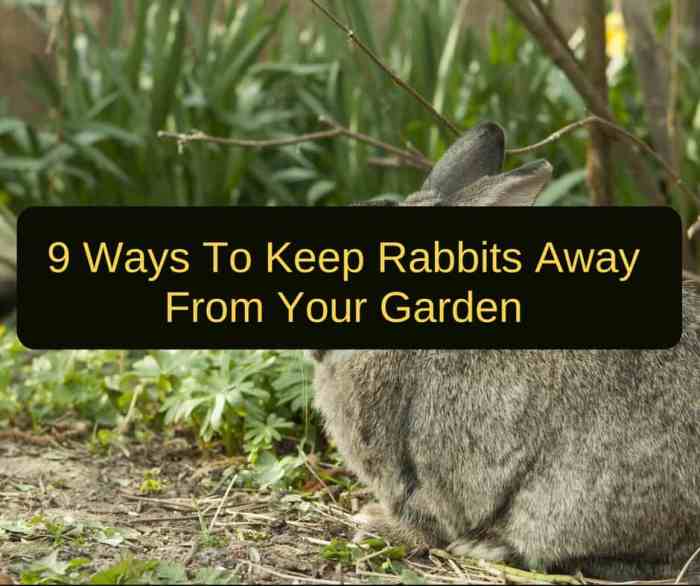Rabbits can be a nuisance in gardens, nibbling on plants and leaving behind unsightly damage. Fortunately, there are a variety of plants that rabbits find unappealing, making them effective deterrents. This guide will delve into the world of rabbit-repellent plants, exploring their characteristics, planting strategies, and additional measures for rabbit control.
By incorporating these plants into your garden, you can create a haven where rabbits think twice before venturing in.
Whether you have a sprawling rural garden or a compact urban oasis, there are rabbit-deterrent plants suited to your needs. We’ll provide guidance on selecting the most effective plants for different garden environments, considering climate, soil conditions, and other factors.
By understanding the principles of rabbit deterrence and implementing these practical solutions, you can reclaim your garden from the furry invaders and enjoy a thriving, rabbit-free space.
Common Plants That Deter Rabbits
Rabbits are known for their voracious appetite for vegetation, making them a common nuisance in gardens and landscapes. However, certain plants possess specific characteristics that act as effective deterrents against these furry pests. These plants often have strong scents, bitter tastes, or prickly foliage, making them unpalatable or uncomfortable for rabbits to consume.
Effective Rabbit Deterrent Plants
Several popular plants have been proven to repel rabbits, including:
- Lavender: Its strong, fragrant aroma is unpleasant to rabbits.
- Rosemary: Its pungent scent and bitter taste deter rabbits.
- Marigolds: Their vibrant flowers and pungent odor repel rabbits.
- Salvia: Its aromatic leaves and stems deter rabbits.
- Peppermint: Its strong, minty scent is unappealing to rabbits.
By incorporating these plants into your garden or landscape, you can create a natural barrier that discourages rabbits from feeding on your prized plants.
Planting Strategies for Rabbit Deterrence
To enhance the effectiveness of rabbit deterrents through planting, strategic methods can be employed. Companion planting, optimal spacing, and the utilization of raised beds or barriers contribute to creating an environment less appealing to rabbits.
Companion planting involves strategically placing certain plant species together to benefit each other. For instance, planting garlic, onions, or chives near susceptible plants can act as natural repellents due to their pungent odor. Marigolds, with their distinct scent, also deter rabbits.
Spacing Considerations
Adequate spacing between plants is crucial. Overcrowding can create hiding places for rabbits, making them more likely to venture into the garden. Providing ample space between plants reduces their ability to conceal themselves and discourages them from approaching.
Raised Beds and Barriers
Raised beds elevate plants, making them less accessible to rabbits. The height of the raised bed should be at least 24 inches to deter rabbits effectively. Additionally, physical barriers, such as fencing or chicken wire, can be installed around the garden to prevent rabbits from entering altogether.
Additional Measures for Rabbit Control

While deterrent plants can be effective, they may not be sufficient on their own. To enhance rabbit control, consider implementing additional non-plant-based measures:
Fencing
- Install a fence at least 2-3 feet tall, buried 6-12 inches underground to prevent burrowing.
- Use galvanized wire mesh with openings no larger than 1 inch.
- Consider adding an electric wire along the top to deter climbing.
Motion-Activated Sprinklers
These devices detect movement and spray water, startling rabbits and deterring them from the area.
Repellents
- Apply commercial rabbit repellents containing capsaicin, peppermint oil, or garlic.
- Homemade repellents include a mixture of vinegar and water or a spray made from crushed garlic.
- Note that some repellents may be harmful to pets or children, so use with caution.
Considerations for Specific Garden Environments
When selecting rabbit deterrent plants, consider the unique characteristics of your garden environment, including its location, climate, and soil conditions.
Urban Gardens
In urban environments, space is often limited. Choose compact plants that can thrive in containers or vertical gardens. Consider plants with dense foliage, such as rosemary, lavender, and marigolds, which can create a physical barrier against rabbits.
Rural Gardens
Rural gardens often have more space and can accommodate larger plants. Opt for shrubs and perennials that grow tall and bushy, such as viburnum, boxwood, and yarrow. These plants provide cover for beneficial insects and create a less inviting environment for rabbits.
Raised Bed Gardens
Raised bed gardens offer better drainage and soil quality, making them ideal for growing rabbit deterrent plants. Choose plants that prefer well-drained soil, such as thyme, sage, and oregano. You can also add gravel or mulch around the plants to deter rabbits from digging.
Last Point
Incorporating rabbit-deterrent plants into your garden is a natural and effective way to keep these pesky creatures at bay. By understanding the characteristics of plants that rabbits dislike, employing strategic planting techniques, and implementing additional measures, you can create a garden that is both beautiful and rabbit-proof.
Remember, the key to successful rabbit deterrence lies in a combination of approaches. So, arm yourself with this knowledge and let your garden flourish without the worries of rabbit invasions.
Questions and Answers
What are the most effective plants for deterring rabbits?
Lavender, rosemary, marigolds, mint, and garlic are all excellent choices.
How should I plant rabbit-deterrent plants?
Plant them in clusters around the perimeter of your garden and near potential entry points.
Can I use other methods besides plants to deter rabbits?
Yes, fencing, motion-activated sprinklers, and repellents can also be effective.
What if I have a small garden?
Raised beds and container gardening can be effective in small spaces.